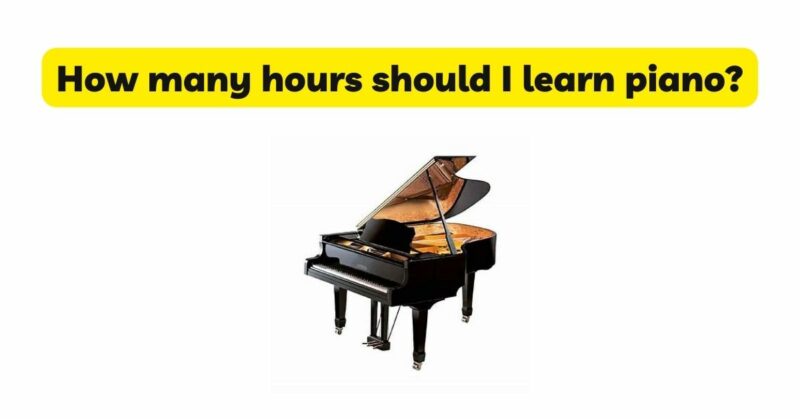Learning to play the piano is a journey that requires dedication, discipline, and consistent practice. Aspiring pianists often wonder how many hours they should dedicate to learning the instrument each day. While there is no one-size-fits-all answer to this question, as the optimal practice duration varies depending on individual factors and goals, this article aims to provide insights into finding the right balance for effective piano learning. By understanding the variables at play and considering practical strategies, individuals can establish a practice routine that maximizes progress and enjoyment in their piano journey.
Factors Influencing Practice Duration:
- Learning Goals and Aspirations:
The practice duration for piano learning is influenced by individual goals and aspirations. Your goals may range from playing for personal enjoyment to pursuing a professional career as a pianist. The intensity and time commitment required will vary based on your ambitions. Clarifying your goals will help determine the practice duration needed to achieve them.
- Practice Consistency:
Consistency is key in piano learning. Regular and consistent practice allows for skill development, muscle memory, and retention of knowledge. It is generally more effective to have shorter practice sessions on a daily basis rather than longer, infrequent sessions. Consistency builds momentum and helps maintain focus and progress over time.
- Skill Level and Experience:
The practice duration can be influenced by your current skill level and prior musical experience. Beginners may require more time to grasp basic concepts and develop fundamental techniques, while more advanced players may need longer practice sessions to tackle complex repertoire and refine their skills. Adjusting the practice duration based on your skill level ensures a balanced and targeted approach to learning.
- Focus and Quality of Practice:
The quality of practice is equally important as the duration. Engaging in focused and intentional practice sessions yields better results than mindless repetition. It is crucial to practice with concentration, employing deliberate practice techniques such as breaking down challenging passages, working on specific technical difficulties, and using slow practice for accuracy and control. Practicing with focus and attention optimizes progress within the time allocated.
Finding the Optimal Practice Duration:
- Beginners (30 minutes to 1 hour):
For beginners, dedicating 30 minutes to 1 hour of practice each day is a good starting point. During this stage, the focus is on developing proper technique, hand positioning, and basic music reading skills. Breaking down practice time into shorter sessions of 15 to 30 minutes, multiple times a day, can help maintain focus and prevent fatigue. As beginners progress and become comfortable with the instrument, the practice duration can gradually increase.
- Intermediate Players (1 to 2 hours):
Intermediate players, who have a grasp of basic techniques and musical concepts, may benefit from practicing 1 to 2 hours per day. This duration allows for deeper exploration of repertoire, development of more advanced techniques, and enhancement of musical interpretation. Intermediate players can allocate their practice time to various aspects, including technique exercises, repertoire learning, sight-reading, and theory studies.
- Advanced Players (2 to 4 hours):
Advanced players who are aiming for higher levels of proficiency and performance may dedicate 2 to 4 hours of practice daily. At this level, a more substantial practice duration is often necessary to master complex repertoire, refine technical skills, and deepen musical understanding. Advanced players may divide their practice time into focused segments, including warm-up exercises, technique drills, repertoire polishing, and performance preparation.
Strategies for Effective Practice:
- Establish a Structured Practice Routine:
Creating a structured practice routine is essential for consistent progress. Set aside specific practice times each day and adhere to them diligently. Breaking practice sessions into focused segments targeting different aspects (technique, repertoire, sight-reading, theory) helps optimize practice time and facilitates growth.
- Prioritize Technique Development:
Devote time to developing fundamental piano techniques such as hand position, finger dexterity, and control. Incorporate targeted exercises and drills into practice sessions to strengthen finger independence, coordination, and agility.
- Employ Deliberate Practice Techniques:
Make use of deliberate practice techniques that enhance learning and skill development. These techniques include breaking down challenging passages into smaller sections, using a metronome for accuracy and rhythm, employing slow practice for precision, and practicing with focused attention on specific challenges.
- Select Appropriate Repertoire:
Choose repertoire that suits your current skill level and allows for progressive growth. Starting with simpler pieces and gradually progressing to more challenging ones ensures a balanced learning experience. Working on a diverse range of repertoire helps broaden musical understanding and enhances overall playing abilities.
- Seek Guidance and Feedback:
While self-learning, seek opportunities for guidance and feedback. Periodic check-ins with experienced musicians or piano teachers can provide valuable feedback, offer technical guidance, and address specific challenges or questions that arise during the learning process.
- Practice Efficiently:
Focus on quality rather than quantity. Engage in focused practice sessions that maximize learning and progress. Concentrate on specific areas that need improvement, break down challenging passages, and use techniques like visualization and mental practice to enhance performance skills.
Conclusion:
Determining the optimal practice duration for piano learning is a highly individual process, influenced by factors such as learning goals, skill level, practice consistency, and focus. While there is no magic number of hours that guarantees success, a general guideline can be established based on the stage of learning and personal circumstances. Beginners may start with 30 minutes to 1 hour, intermediate players may dedicate 1 to 2 hours, and advanced players may commit 2 to 4 hours per day. The focus should be on establishing a structured practice routine, prioritizing technique development, employing deliberate practice techniques, selecting appropriate repertoire, seeking guidance when needed, and practicing efficiently. Remember, the joy of playing the piano comes from the progress made and the love for music. Finding the right balance between practice and enjoyment is key to a fulfilling and successful piano journey.


